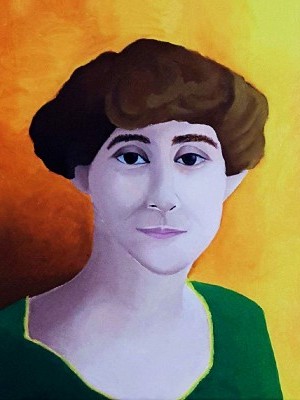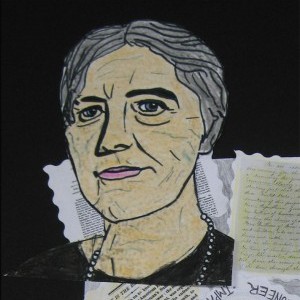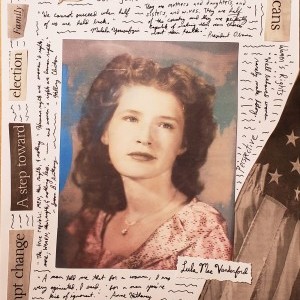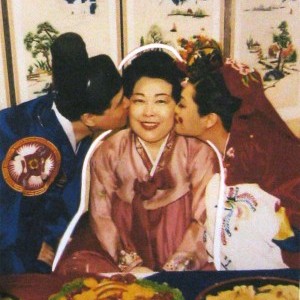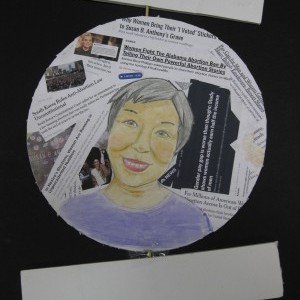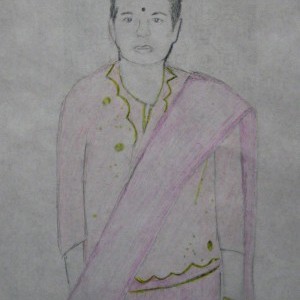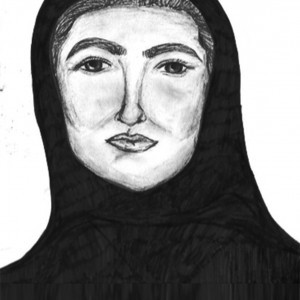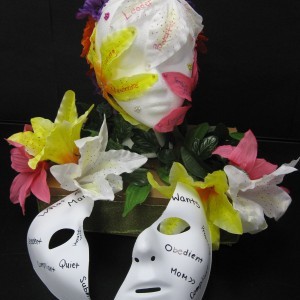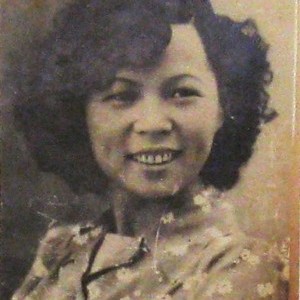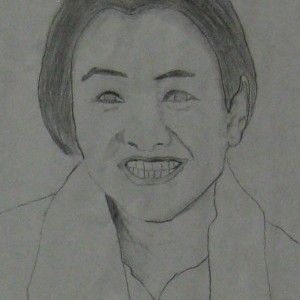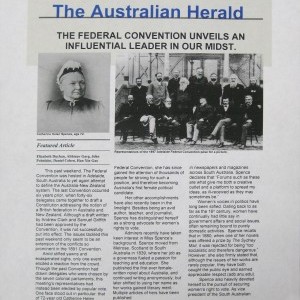Gina Chen, Junna Peng, Mia Vogel, Faye Shemper & Jia Xiao Chen
Townsend Harris High School | Flushing, NY | 11th Grade
Inspirational Family Member
Faye's Mother
For my mother and her family, voting was merely an institutionalized and arguably meaningless force of habit until her immigration to America in 1989. Born of Ukrainian descent into the Soviet Union and having spent only the first fifteen years of her life there, my mother had no voting rights whatsoever in her country of birth. Her parents and most adults she knew, however, voted at every election, a practice seldom understood against the ironic background of its historical context. At the time, voting in the Soviet Union was not mandatory, but it was almost societally unacceptable and certainly looked down upon if one chose not to participate. The elections in the USSR typically had only one candidate on the list, giving no real choice to the voter. And while it was possible to vote against a candidate, such a choice was guaranteed a spot in the minority; thus it seemed from nearly every angle that voting was emphatically pointless.
Why, then, was everyone prompted to cast a vote? My mother explains that her parents would head to the polling place, show their ID, and be marked for participation. It was known that votes would never truly be counted, and if they were, it would be left to the corrupt government to select the candidate of their choice anyway. An essential factor of these elections was fear, as there was a clear record held of those who voted and those who did not. My mother recounts stories of officials knocking on doors and (rather intensely) reminding those who had not yet done so to place their votes. Most, therefore, would go to vote for the candidate they knew would be chosen anyhow, and would want to be seen near the voting booths so as not to be criticized later.
Essentially, my mother had no voting rights in her country of birth primarily due to her age at the time, but it is evident that even if she had been older, her vote would hold little to no weight in the overarching communist regime that was the USSR. After moving to America and several years thereafter turning 18, my mother gained the right to vote. She took advantage of it immediately, and since then has not passed up a single opportunity to express her opinions about the nation’s government, voting in every major U.S. election.
Historical Figure I Admire
Jeannette Rankin
Throughout her life, Jeannette Pickering Rankin accomplished many great things and brought about a lot of change through her work as a suffragist and a Congresswoman. Born on June 11th, 1880 near Montana to a rancher and schoolteacher, she was the eldest of 6 children. Her only brother, Wellington, would later be elected Montana’s attorney general and an associate justice of the state’s Supreme Court. His influence and political connections would prove to be useful in the future when she decided to run for a House seat from Montana in 1916. Before running for Congress however, Rankin graduated from Montana State University in 1902 and briefly worked as a social worker in Spokane, Washington, before entering the University of Washington in Seattle a few years later.
It was in Seattle where Rankin joined the women’s suffrage movement, a campaign that in November 1910, achieved its goal when Washington became the 5th state in the Union to give women the right the vote. After her success in Washington, Rankin moved back to New York to join the New York Woman Suffrage Party and became a lobbyist for the National American Woman Suffrage Association. In February of 1911, Rankin returned to her home state of Montana and became the first woman to speak in front of the state legislature regarding women’s suffrage. She joined several suffrage organizations, rising through the ranks and becoming president of the Montana Women’s Suffrage Association. Through her strong leadership and the hard work of both her and other suffragettes, the state of Montana officially passed an amendment in November 1914, granting women the permanent and unrestricted right to vote in elections.
Rankin’s reputation as a suffragist as well as her brother’s political influence both worked to her advantage when she decided to run for a House seat from Montana in 1916. Despite fears from some national suffrage leaders that Rankin losing would hurt the cause, she succeeded in securing a Republican nomination in August of 1916. A big part of her campaign emphasized her dedication and commitment to furthering women’s suffrage as well as the social welfare of the nation in general. She was also a long time pacifist who during both World War I and World War II, voted against the US joining the international conflict. Her efforts and campaign were ultimately a success as in late 1916, she became the first woman in American history to be elected into Congress and on April 2nd, 1917, she was officially sworn into office.
With her unprecedented achievement in becoming the first Congresswoman in American history, Rankin became a prime figure in the fight for women’s suffrage across the nation. In January 1918, when Congress held a special committee regarding a constitutional amendment on woman suffrage, Rankin led the debate on behalf of suffragists and women’s rights advocates. Despite losing this battle after a failure by the Senate to pass the resolution however, they won the war in 1920 when the 19th Amendment was ratified and women’s suffrage was granted across the nation. Rankin’s contributions to this victory is often under-appreciated and goes unnoticed by many but the part she played is integral to the history of women’s suffrage and her efforts undoubtedly propelled the issue into the front of America’s agenda and brought the nation closer to resolving it.
SOURCES +
What the Project Means to Me
Through the process of researching Jeannette Pickering Rankin, I was able to better understand the often unacknowledged and underappreciated efforts she and other suffragettes made toward the addition of women’s suffrage to the United States Constitution. My great-grandparents’ decision to leave their native country and immigrate to the United States was primarily driven by economic hardship in Romania, and the improved conditions they met upon arriving in New York Harbor were further advanced by both of their children’s right to vote upon reaching adulthood, regardless of biological gender. Rankin’s contributions toward the Women’s Suffrage Movement undoubtedly had a significant impact on their experiences as well as countless other American women of the early twentieth century to the present.
Evaluating the connections between the progress made by leading suffragettes and the experiences of second generation immigrants is of particular importance as it is necessary in order to examine the ever-growing diversity of the United States. In passing the nineteenth Amendment, our nation was better able to represent its people by including a large portion of its population that had previously been overlooked and generally disenfranchised during elections. The concept of representation plays into the weight of all levels of voting; because local, state, and federal elections are all of importance in varying forms, each citizen’s right to vote should be exercised as their duty and opportunity to actively participate in their communities and ensure that their voices are represented in all elections. Overall, Rankin’s work toward the passage of the nineteenth Amendment markedly increased the quantity and diversity of Americans represented in United States elections.
Explore the Archive
More From This Class
Click on the thumbnails below to view each student's work.
Vivian Chen, Josephine Chen, Ivan Chan, Zafirah Rahman, Neeharika Reddy, Daniel Shi, Daniel Shi, Jacqueline Cho & Osiris Guerrero

Jennifer Moran, Adebola Ademola, Julia Hong, Vicki Kanellopoulos, Inga Kulma, Maimunah Virk, Deborah Molina & Kailey Van
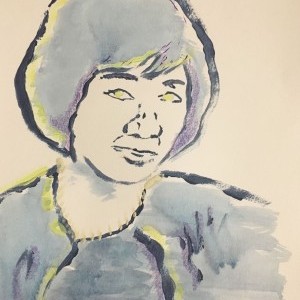
Kristina Chang, Sarah Chowdhury, Bethany Leung, Letian Fang, Cathy Choo, Kelly Chan, Emily Tan, Adamary Felipe & Kenney Son


